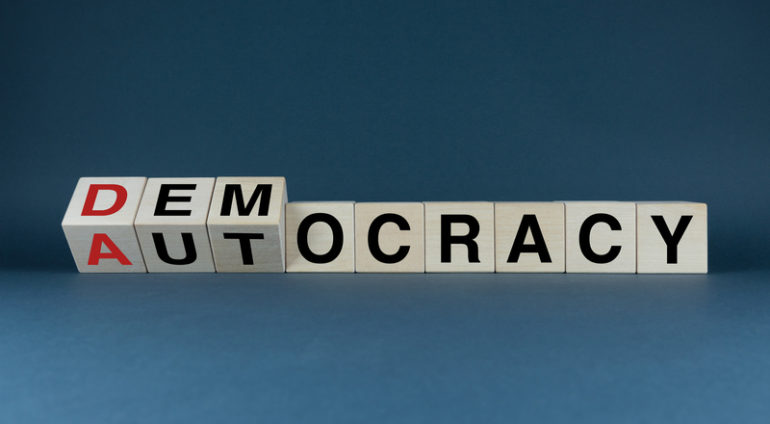
by Emmet Pierce
Guest Commentator
Americans can be forgiven if they’re feeling a strong sense of déjà vu.
As the 2024 presidential election draws near:
•Right-wing extremists are encouraging acts of violence against their opponents.
•Political pundits are using mass media to promote conspiracy theories and attack minority groups.
•People of color are facing voter suppression.
•Risky banking practices are undermining faith in the nation’s financial system.
These events seem ripped from today’s news headlines, but all occurred during the 1930s. As the nation struggled through the Great Depression, the future of democracy in America seemed uncertain. Anyone who has studied this dark period can’t help but draw parallels to things happening today.
When the fascist regimes of the 1930s began attacking democratic nations here and abroad, the jury was out on whether free republics could survive. Self-ruled nations emerged intact from the challenges of the depression and the world war that followed, but there’s no guarantee that America’s democracy will survive today’s assaults.
Democracy is vulnerable to attack because it’s hard to maintain. It requires people with opposing views and philosophies to work together to reach compromises. The nonpartisan Pew Research Center consistently has found that large segments of populations in today’s democratic nations are dissatisfied with their governments. Unlike authoritarian governments led by a single leader or party, democracies often are slow to take action in the face of pressing problems, such as widespread poverty, bigotry, economic collapse, and racial discrimination. When the fairness and competence of political systems are in doubt, confidence wanes.
Even at its best, democracy is a work in progress, subject to fits and starts. Eras of progress often are followed by acts of repression. From its inception, America has struggled to provide equal rights under the Constitution to all of its citizens. Witness the long struggle of Black Americans to vote, attend public schools, and live in neighborhoods of their choosing. Think back to the decision to incarcerate thousands of Americans of Japanese dissent during World War II. But for all its imperfections, democracy is preferable to life under authoritarian rule. Authoritarian governments are more likely to restrict freedoms and exercise control over courts, law enforcement, and other public institutions.
The Jan. 6, 2021 riot in the U.S. Capitol by people who attended a rally for ousted President Donald Trump alarmed democratic leaders throughout the world. The violent attack on Congress was a wakeup call for those who believed that the end of the chaotic Trump administration would mean a return to political normalcy for America. While it’s tempting to blame Trump, the discontent that surfaced existed before he arrived on the political scene and it is likely to continue after he has left it.
The current political divisions among Americans have been made much worse by the shift in broadcast and online journalism away from objective reporting. Mainstream newspapers rapidly are being replaced news sources that are less committed to objectivity. Opinion and angry political messages now dominate the 24-hour cable and Internet news cycles. Conflicting information often leaves Americans wondering whom to believe.
Political commentators masquerading as journalists would have us believe that the U.S. government and its institutions are the true enemy. News Corp. Executive Chairman Rupert Murdoch recently admitted in court documents that he allowed Fox News hosts to promote the idea that election fraud robbed Trump of a second term as president, even though Murdoch knew the allegation to be false. CNN, MSNBC, and others also have been guilty of blending fact with opinion.
Today’s political commentators aren’t the first to use mass media to undermine the government. Radio personality Charles E. Coughlin gained widespread popularity in the 1930s while attacking the President Franklin Roosevelt and supporting fascist dictators Adolf Hitler and Benito Mussolini. Eventually he called for the abolition of American political parties and questioned the value of U.S. elections.
Misleading messages always will resonate with some Americans, no matter how absurd they seem. An example is “Pizzagate.” In 2016 a man armed with an assault rifle was arrested after entering a Washington, D.C. pizza parlor. He said he came in response to reports that Democratic presidential nominee Hillary Clinton was the leading a child sex ring out of the restaurant. The false Pizzagate story had gone viral on the Internet.
A generation ago, when Americans depended chiefly on newspapers, radio, and television for their news, reporters were taught that their personal views didn’t matter. Editors strived to keep reports objective. It was difficult to guess how broadcast and print journalists felt about the topics they covered, and that was the point. The consumers of news were left to make up their own minds.
Democracy’s survival today depends on the ability of Americans to distinguish legitimate news from conspiracy theories and messages of hate. That means closely scrutinizing news sources before sharing information on social media or embracing alarmist messages. It also requires people — regardless of their political leanings — to resist the temptation to use only those news outlets that reinforce their personal views.
I see no end to the use of the Internet, radio, and television to circulate stories that frighten and divide Americans. The foes of democracy have tapped into a growing discontent. If their false narratives go unchallenged, political divisions are certain to deepen.
Emmet Pierce is an award-winning freelance writer.
Photo 264714732 © Prazis | Dreamstime.com
















